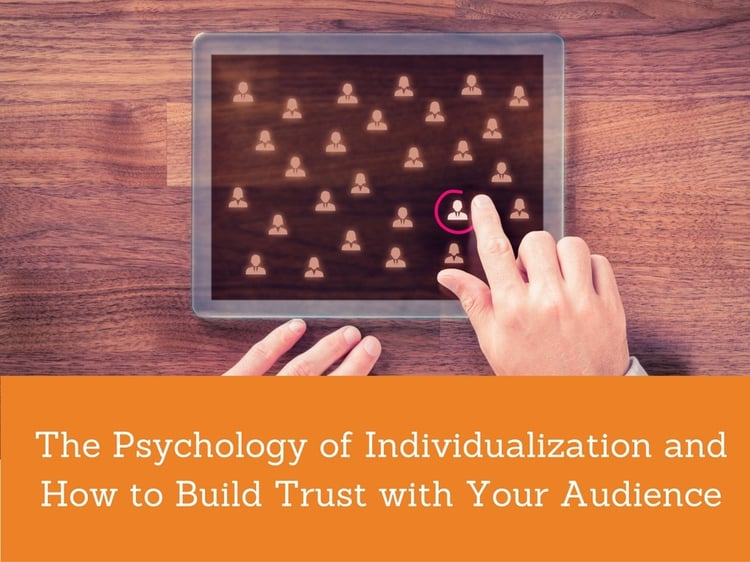In the fast-paced world of e-commerce, one of the greatest challenges marketers face is dealing with cart abandoners. These are the customers who browse your online...

In today’s era of data and technology, every company wants to engage in individualized marketing. However, delivering individualization goes beyond addressing an email or direct mail piece with a first name or job title. To truly market to individuals, you have to understand what motivates them, and then gain their trust in order to move them to action. Understanding and trust go far beyond analyzing basic surveys, demographics and order histories. Paying attention to customer intent is the real key to individualized marketing.
Individualization and the Modern Consumer
Before you think about an individualized approach to marketing, it helps to understand the mindset of the modern consumer. Today’s customer no longer cares solely about price. Service and reliability are just as important as a lower cost, and it’s the overall customer experience that’s the driving force behind repeat business and referrals to others.
A stellar customer experience isn’t just a nice thing to do — it’s a virtual requirement in the modern business era. Consumers are willing to pay more when they’re guaranteed a good experience. But to accept these terms means you can’t deliver a great experience at only one touchpoint. You have to make every interaction special for your customers every time. And the best way to do that is to get to know your customers on an individual level by creating a single customer view.
You can’t individualize your marketing for your customers if you don’t have a clear picture of how they interact with your company across all touchpoints as well as how they engage with other brands. Individualized marketing starts with gathering both structured and unstructured data and combining that information to create actionable insights at an individual shopper level.
What Is the Psychology of Individualization?
Using individualized marketing requires the ultimate commitment to customers. It means reaching people with the message that is most likely to help them in the moment, at the times at which they are most likely to respond. There are a lot of boxes to check off in order to truly tailor your approach to each unique customer, and if you’re not fully committed to individualization, your efforts won’t be effective.
Understanding the psychology behind individualization is essential for success. Everyone knows marketers are always looking for ways to entice consumers into making purchases. The problem is that consumers have become increasingly wary of these practices. With every pop-up ad or misguided email received, modern-day consumers lose a little more faith in the advertising industry and, by extension, the companies issuing these messages.
Incorporating each individual’s preferences and personalities into a single customer view helps marketers understand what motivates a person to act. Consider the case of Amazon, a worldwide name not only because of their selection and low prices, but because people trust Amazon to give them a positive experience every time. To that end, Netflix generates 75 percent of its rental income from personalized suggestions via complex algorithms that monitor your browsing and watching habits. Companies that have the right data to gain a complete view of their customers — and what those customers want and when they want it — will enhance the customer experience and provide top-notch individualization that consumers deserve and expect. In doing this, companies can reach consumers more effectively, and consumers can trust that the data they’ve shared with a company is being used responsibly to create added value — and that they’ve made these additional purchases of their own accord, without being coerced by the company.
Understanding the psychology of individualized marketing is just one part of the equation. It’s just as important to have a strategy to use this concept in a way that engages your customers.
The Psychology of Reaching Your Audience with Individualized Marketing
One of the aspects of modern marketing that’s most frustrating to consumers is that marketers frequently come out of the woodwork only when it’s beneficial for them. These businesses come across like a friend that only reaches out to you when they need something from you, but aren’t willing to reciprocate the behavior.
People like to feel included, appreciated and understood, and modern technology gives next-gen marketers the ability to use these emotions to their advantage more than ever before. And consumers, fully aware of the data exchange in which they take part every time they interact with a company, are more than willing to play the game in order to get a better experience.
However, it’s up to you to connect the dots and identify the best ways to reach each consumer. People aren’t likely to spell out exactly how you should market to them. What you can do, though, is pick up on the clues that are left by consumers. Your strategy should be based around the use of intent data — the signs that are exhibited by a customer who’s ready to buy. These signs could include frequent visits to your website, social media activity or signing up for promotional offers via email. When you see these signs, it’s time to ramp up your individualized marketing, not in a way that alienates consumers, but instead in a manner that engages consumers and enhances the customer experience.
Individualizing at All Touchpoints — Even Direct Mail
The one problem with individualized marketing is that it’s widely been a digital game. For instance, many marketing structures are geared towards funneling people to their website, using email marketing to remind consumers about recently viewed items or using geo-targeting to send digital display ads to prospects when they’re near a company’s store. Doing this makes the digital landscape more saturated, which means it’s increasingly likely for your digital messages to get lost in the shuffle. And it means marketers are neglecting a highly valuable marketing medium: direct mail.
Marketing automation is a major force in the modern business world and with good reason, and automation isn’t limited to online marketing. Using programmatic postcards, you can arrange the delivery of automated postcards to individuals who browse your website and are showing signs of intent. This is a highly effective strategy for two reasons. First, direct mail has a much higher response rate than digital marketing. Second, in this world of digital communication, there’s something to be said for an individualized piece of direct mail. Because of the lack of clutter, your message will be seen immediately by recipients, something that cannot be said for email marketing or banner ads. Additionally, the tangible nature of the postcard means that it can be placed anywhere as a reminder for that individual to complete their purchase. It’s an underutilized medium in a digital world — an individualized, friendly and effective direct mail piece that shows people you understand them.
Trust: The Key to Leveraging the Psychology of Individualization
Today’s consumer is more demanding than ever, but with good reason. They must trust that your organization will use the data they provide responsibly, while also providing them with value at all touchpoints. A fully immersive and enjoyable customer experience is a must for any business that wants to keep its customers. The use of individualized marketing requires a deep understanding of the psychology of individualization, as well as how that psychology relates to each individual customer. When this idea is applied in an engaging and customer-friendly manner, such as programmatic postcards, the customer experience blossoms, enabling consumers and businesses to continue to grow with each other as they build trust.

